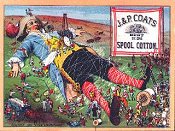Two scenarios for cultural anthropology students
TL;DR:
This exercise invites cultural anthropology students to view their own culture through an etic (outsider’s) lens, using two reality-suspending scenarios. The first involves a "Gulliver's Travels" scenario. The second is that of a visit to a McDonald's Restaurant by an alien. Both scenarios help students step outside their own worldview, recognize cultural assumptions, and discover meaning in everyday spaces.
Let's imagine: Gulliver's Travels and McDonald's restaurants
- Analyze your own culture through an outsider's lens:
Suspend reality and examine your culture with an etic perspective.
- Join Gulliver's Travels and share your story with Laputa's inhabitants using only five objects.
- Imagine being alien space travelers studying Earth through a
McDonald's restaurant - what cultural insights can you glean from architecture, food, gender roles, and family dynamics?
- Uncover cultural values in unexpected places: McDonald's becomes an ethnographic "text" to understand life on planet Earth in a unique way.
Can we learn something by looking at our own culture from an etic perspective?
These two scenarios call on us to suspend reality. We move into an almost
science fiction mode. Force yourself to "think outside the box." In both instances, you are asked
to look at your culture from an "etic" -- or outsider's -- viewpoint.
Scenario #1
Remember Gulliver's Travels? Written in the early 1700s by Jonathan Swift,
this delightful book (which was actually meant as social satire) recounts voyages to one strange
place after another. The most well-known of those places is Lilliput, where Gulliver is "captured" by a race of minuscule human beings, an event depicted in this antique advertisement by a thread company.
Gulliver's third voyage takes him to the flying island of Laputa. The inhabitants of that island speak a language that Gulliver does not know.
Suppose you were to travel with Gulliver to that flying island where you can communicate with people only by using objects you carry with you. Suppose you could take only five things with you to "tell" people on Laputa about yourself.
What would those objects be? Once you've decided on them, write them on the chalkboard.

Discussion questions
- How did the exercise of choosing five objects to communicate with the inhabitants of Laputa make you reflect on your own culture and personal identity?
- What criteria did you use to select the objects? How did these objects represent different aspects of your culture?
- Were there any challenges or limitations in using objects to communicate information about your culture? How did you overcome them?
- In what ways did your chosen objects reflect cultural values or social norms? How might the inhabitants of Laputa interpret or understand these objects?
- How did imagining yourself as an outsider looking at your own culture from an etic viewpoint change your understanding or perception of your culture? Did you gain any new insights?
Scenario #2
You are space travelers who have been beamed down to Earth from the planet Pegasi. You
don't know anything about life on planet Earth, but you have been instructed to carefully study
what is going on and to report back your observations. When you were beamed down, you ended
up in a McDonald's restaurant, a place that you assume is typical for the entire planet.
Therefore, a McDonald's restaurant has become an ethnographic "text" for you. Look for things
that reveal cultural values and practices. From your observations of the following things in the
restaurant, what might you conclude about life on the planet Earth?

- Architecture/Furnishings
- Food
- Sex or gender roles
- Family
Discussion questions
- What insights about the culture of planet Earth can you gather from observing the architecture and furnishings of the McDonald's restaurant?
- How does the food offered at McDonald's reflect cultural preferences or practices on planet
Earth? Can you identify any specific cultural values associated with the food choices?
- Based on your observations, what conclusions can you draw about sex or gender roles in the
context of a McDonald's restaurant on Earth? Are there any noticeable patterns or differences?
- How does the concept of family manifest itself in the McDonald's restaurant environment?
Are there any cultural assumptions or norms related to family dynamics that you could justifiably infer?
- Reflecting on your experience of studying Earth through the lens of a McDonald's restaurant,
what might be some limitations or biases in using a single geographic location to understand an entire
planet's culture? How might your observations differ if you examined other aspects of Earth's culture?
PDF file of this page
-- Howard Culbertson, hculbert@snu.edu
More cultural anthropology resources
Ready to get started on your research paper?
Related articles


